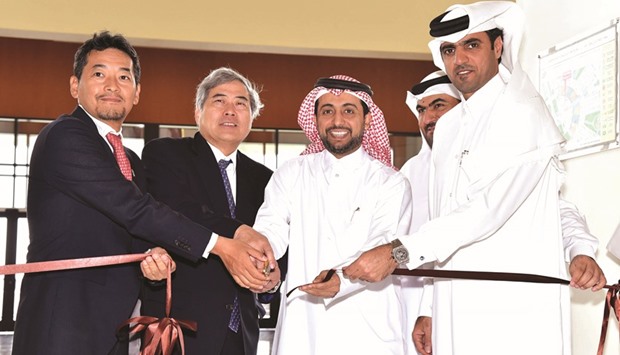Some 60 pictures showing the devastation caused by the March 1, 2011 tsunami in Japan and the recovery efforts are featured at a photo exhibition on the occasion of the tragedy’s sixth anniversary.
The exhibition, themed “East Japan Earthquake Exhibition: Then and After,” is organised by Qatar University’s College of Arts and Sciences (QU-CAS), in collaboration with the Japanese embassy in Doha and Marubeni Corporation. It will run until March 30.
One of the pictures shows how Sendai Airport was buried under the tsunami rubble, but a month later, it resumed operation.
“In the aftermath, what we see is a story of resilience, reconstruction, and support. It is in the spirit of friendship that the State of Qatar provided humanitarian relief of $100mn to help rebuild the devastated areas in Eastern Japan, through the Qatar-Japan Friendship Fund,” QU president Dr Hassan al-Derham said in his speech.
“Indeed, such efforts by the Japanese people and how they have overcome this tragedy, is something I, and many others across the world, draw strength and inspiration from,” he noted.
Citing Qatar and Japan’s strong relationship developed over 40 years, the QU president cited a number of activities that emerged and strengthened such friendship.
The launch ceremony was also attended by Japanese Ambassador Seiichi Otsuka, Qatar Fund For Development (QFFD) director general Khalifa bin Jassim al-Kuwari, Marubeni Corporation managing director Toshiaki Hato, and other CAS senior officials.
Inspired by Qatar’s generous gesture, the envoy said a Japanese film producer created a documentary film entitled Beyond the Tsunami.
“I sincerely hope that this photo exhibition will be an opportunity to understand disaster risk and prevention, and to develop and implement an appropriate readiness to disaster risk reduction.” Otsuka said.
Qatar’s aid to Japan led to the setting up of the Qatar Friendship Fund, focusing on child education, healthcare and fisheries.
In October 2016, QFFD concluded the activities of Qatar-Japan Friendship Fund in Japan, helping thousands of people restore their lifestyle through 13 projects.
The first mega project was the Masker Fish processing facility, considered as a “wonderful gift to Onagawa town.”
Al-Kuwari said the Fund focused on four main priority areas - healthcare, fisheries, child education, and entrepreneurship.
“Over the past five years, the $100mn fund have benefited around 640,000 people directly and indirectly with an economic ripple effect of projects (in 2016 only) reaching $120mn projected to increase up to $1.8bn in the next 10 years,” he said, citing a study recently released by Mitsubishi Research Institute.
Meanwhile, Marubeni, together with QU and the embassy, is doing a series of activities that contribute to Qatari society, particularly in the field of culture and education.

QU president Dr Hassan al-Derham and Japanese ambassador Seiichi Otsuka lead the ribbon-cutting ceremony at the photo exhibition.
